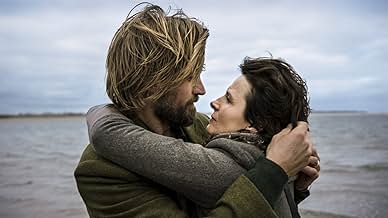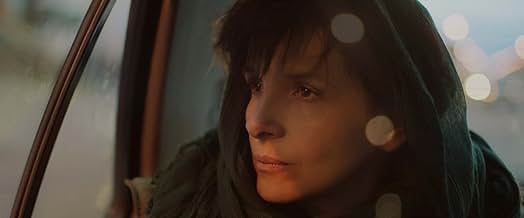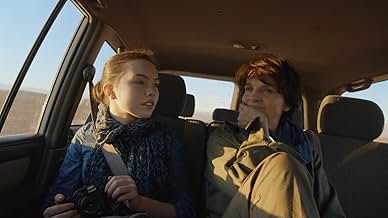CALIFICACIÓN DE IMDb
7.0/10
8.3 k
TU CALIFICACIÓN
Agrega una trama en tu idiomaRebecca is one of the world's top war photographers. She must weather a major emotional storm when her husband refuses to put up with her dangerous life any longer.Rebecca is one of the world's top war photographers. She must weather a major emotional storm when her husband refuses to put up with her dangerous life any longer.Rebecca is one of the world's top war photographers. She must weather a major emotional storm when her husband refuses to put up with her dangerous life any longer.
- Dirección
- Guionistas
- Elenco
- Premios
- 6 premios ganados y 14 nominaciones en total
Zoubida Akif
- Ariana
- (as Zoubida Afik)
Opiniones destacadas
What I was hoping would be a thought-provoking trip into the psychology of the heart of bloody conflict instead becomes a pompous, boring, weighted thing of mediocrity. It's almost as if the director believes that the seriousness of the subject matter is enough to make the film compelling to audiences - which it isn't.
Unfortunately an important theme still requires pacing - which is not best accomplished by long silences and slow-mo ad-nauseum. The cardboard supporting cast display all the range of a TV commercial trying to inspire sympathy, and there's some atrocious child acting.
I know many people will feel compelled to like this because of the subject matter and the strong female lead, but beyond the façade of great cinematography and overly emotional music this is simply not well made.
Self-importance sinks this film.
Unfortunately an important theme still requires pacing - which is not best accomplished by long silences and slow-mo ad-nauseum. The cardboard supporting cast display all the range of a TV commercial trying to inspire sympathy, and there's some atrocious child acting.
I know many people will feel compelled to like this because of the subject matter and the strong female lead, but beyond the façade of great cinematography and overly emotional music this is simply not well made.
Self-importance sinks this film.
I saw this at The Heartland Film Festival in Indianapolis this weekend. It's been 24+ hours since the movie ended, and it's themes are still with me. The horror of war..the difficulty balancing passion and pragmatism...what do children need from their parents... My mind changed such that the final take away is the theme of the film. Life is difficult and decisions have consequences. I want to have coffee with Rebecca and shake her. Tell her how much her children and husband need her..Tell her the sacrifice isn't worth it. Atrocities will continue. Taking pictures of suicide bombers does glamorous the cause. Taking pictures of deceased Africans doesn't bring them to life. Why are you so angry? For these reasons, I must recommend this film. It is not only well acted, but it creates and stirs up emotions, makes you think. Some time more than entertainment is demanded from a film.
A film about a female investigative journalist is bound to raise a reaction among viewers, especially when the atrocities filmed are so brutal. But that is the point being made by writer/director Erik Poppe (with added written material by Harald Rosenløw-Eeg and Kirsten Sheridan). The main character in this story is Rebecca (a radiant and brilliant Juliette Binoche), one of the world's top war photographers. She must weather a major emotional storm when her husband Marcus (Nikolaj Coaster-Waldau) refuses to put up with her dangerous life any longer. He and their young daughters – especially Steph (Lauryn Canny) but also the much younger Lisa (Adrianna Cramer Curtis) - need Rebecca, who, however, loves both her family and her work. Rebecca has been angry, since a child, over the way people around the globe focus on the detritus of local news and pay little attention to the horrors that occur daily in the countries besieged by terror. Rebecca resolves to take Steph (at Steph's request) to Kenya where inadvertently they witness terrorist acts even though Rebecca had been promised the area was safe. The result of Rebecca's endangering her daughter results in her marriage dissolving, but other changes in Rebecca's smoldering anger and angst result also.
The film is very well photographed and both Binoche and Coaster-Waldau are excellent. The supporting cast is strong (especially a very small bit part for Maria Doyle Kennedy) and the musical score by Armand Amar is deeply moving. The film places before us the incalculable struggles war correspondents face but at the same time it brings to out attention just how impossibly difficult life in troubled countries can be. Grady Harp December 14
The film is very well photographed and both Binoche and Coaster-Waldau are excellent. The supporting cast is strong (especially a very small bit part for Maria Doyle Kennedy) and the musical score by Armand Amar is deeply moving. The film places before us the incalculable struggles war correspondents face but at the same time it brings to out attention just how impossibly difficult life in troubled countries can be. Grady Harp December 14
In a warm sunny day in Montreal I went to watch the very new arrival film "A Thousand Times Good Night". I had no idea how it would be impressive because I could not find much information through the web.
All the people may encounter a paradoxical situation between their family and their job. This fact is more realizable when you are a war photographer. The first scenes of A Thousand Times Good Night are too devastating. You can feel the horror, anger, and self-sacrifice behavior in those Afghan extremists. It seems that the suicide bomber just jumped to her destiny as she had been told to do and in parallel she was scared to death. These paradoxical situations just began from the very first scene and moves through the film. The photographer, Rebecca, had her own dilemmas between her enthusiast and her family life. I think the symbolic scene which shows Rebecca plunging in reverse was frequently displayed to show how it would be difficult to decide in dilemmas. You may watch it or refuse to watch it but it worth to watch because this is life as it is!
All the people may encounter a paradoxical situation between their family and their job. This fact is more realizable when you are a war photographer. The first scenes of A Thousand Times Good Night are too devastating. You can feel the horror, anger, and self-sacrifice behavior in those Afghan extremists. It seems that the suicide bomber just jumped to her destiny as she had been told to do and in parallel she was scared to death. These paradoxical situations just began from the very first scene and moves through the film. The photographer, Rebecca, had her own dilemmas between her enthusiast and her family life. I think the symbolic scene which shows Rebecca plunging in reverse was frequently displayed to show how it would be difficult to decide in dilemmas. You may watch it or refuse to watch it but it worth to watch because this is life as it is!
War photographer Rebecca (Juliette Binoche) is one of the best at her job, obtaining the kind of pictures that invariably get published in western magazines as examples of the violence of conflicts in nonwestern areas such as Afghanistan or Kenya. The only snag is that Rebecca is so obsessed with her work that she cannot understand the damage she is doing to her family back in Ireland, especially her daughter Steph (Lauryn Canny).
The conflict between personal and professional values forms the kernel of Erik Poppe's film. Yet thematically speaking the director is far more interested in prompting reflection on the photographer's trade. While Rebecca certainly shows a good deal of bravery in trying to get the best pictures, we also understand that she is something of a voyeur who actively enjoys intruding into her subjects' personal space. Her fondness for the close-up of suffering people is quite disconcerting, especially in a sequence taking place in the back of an SUV in Afghanistan. In political terms, she adopts a neocolonialist position of the westerner taking scopophilic pleasure in the power she exerts through her camera.
Perhaps the film's most telling moment occurs back in Ireland, when Steph turns the camera on Rebecca and photographs her repeatedly. Rebecca cannot endure the experience of the lens pointing at her in such an intense manner and turns her head away, her eyes filling with tears. Would that Rebecca might understand that her subjects could feel much the same; but if she did so, then she would not be good at her job.
Given the integrity with which Poppe examines this issue, it's rather sad that the film as a whole should be somewhat melodramatic. In the end the action descends into something of a tug-of-love battle between mother and family; at one point Rebecca bundles Steph and her younger sister Lisa (Adrianna Cramer Curtis) in a pathetic attempt to abduct them from their family home. Needless to say husband Marcus (Nikolaj Coaster-Waldau) foils the plot and eventually looks after the girls himself.
The film makes a half-hearted attempt to draw a parallel between Rebecca's wanderlust and the rhythms of the tide (her daughter observes that the photographer is like the sea, coming and going), but unfortunately outstays its welcome: the last half-hour unfolds slowly but predictably towards an inevitable denouement. This is a shame, given the seriousness of its basic premise - almost as if director Poppe had lost the courage of his convictions.
The conflict between personal and professional values forms the kernel of Erik Poppe's film. Yet thematically speaking the director is far more interested in prompting reflection on the photographer's trade. While Rebecca certainly shows a good deal of bravery in trying to get the best pictures, we also understand that she is something of a voyeur who actively enjoys intruding into her subjects' personal space. Her fondness for the close-up of suffering people is quite disconcerting, especially in a sequence taking place in the back of an SUV in Afghanistan. In political terms, she adopts a neocolonialist position of the westerner taking scopophilic pleasure in the power she exerts through her camera.
Perhaps the film's most telling moment occurs back in Ireland, when Steph turns the camera on Rebecca and photographs her repeatedly. Rebecca cannot endure the experience of the lens pointing at her in such an intense manner and turns her head away, her eyes filling with tears. Would that Rebecca might understand that her subjects could feel much the same; but if she did so, then she would not be good at her job.
Given the integrity with which Poppe examines this issue, it's rather sad that the film as a whole should be somewhat melodramatic. In the end the action descends into something of a tug-of-love battle between mother and family; at one point Rebecca bundles Steph and her younger sister Lisa (Adrianna Cramer Curtis) in a pathetic attempt to abduct them from their family home. Needless to say husband Marcus (Nikolaj Coaster-Waldau) foils the plot and eventually looks after the girls himself.
The film makes a half-hearted attempt to draw a parallel between Rebecca's wanderlust and the rhythms of the tide (her daughter observes that the photographer is like the sea, coming and going), but unfortunately outstays its welcome: the last half-hour unfolds slowly but predictably towards an inevitable denouement. This is a shame, given the seriousness of its basic premise - almost as if director Poppe had lost the courage of his convictions.
¿Sabías que…?
- Trivia"A thousand time goodnight" is a line from William Shakespeare's Romeo and Juliet.
- ErroresWhen Rebecca and Marcus are walking hand in hand on the beach after drinking wine with his colleagues, the second shot is a frontal medium shot. In the upper left part of the shot, the sound operator's boom microphone is briefly, but clearly visible.
Selecciones populares
Inicia sesión para calificar y agrega a la lista de videos para obtener recomendaciones personalizadas
- How long is 1,000 Times Good Night?Con tecnología de Alexa
Detalles
- Fecha de lanzamiento
- Países de origen
- Sitios oficiales
- Idiomas
- También se conoce como
- 1,000 Times Good Night
- Locaciones de filmación
- Productoras
- Ver más créditos de la compañía en IMDbPro
Taquilla
- Presupuesto
- EUR 5,284,200 (estimado)
- Total en EE. UU. y Canadá
- USD 53,895
- Fin de semana de estreno en EE. UU. y Canadá
- USD 24,120
- 26 oct 2014
- Total a nivel mundial
- USD 2,549,568
- Tiempo de ejecución1 hora 57 minutos
- Color
- Mezcla de sonido
- Relación de aspecto
- 2.35 : 1
Contribuir a esta página
Sugiere una edición o agrega el contenido que falta

Principales brechas de datos
By what name was Mil veces buenas noches (2013) officially released in India in English?
Responda




























